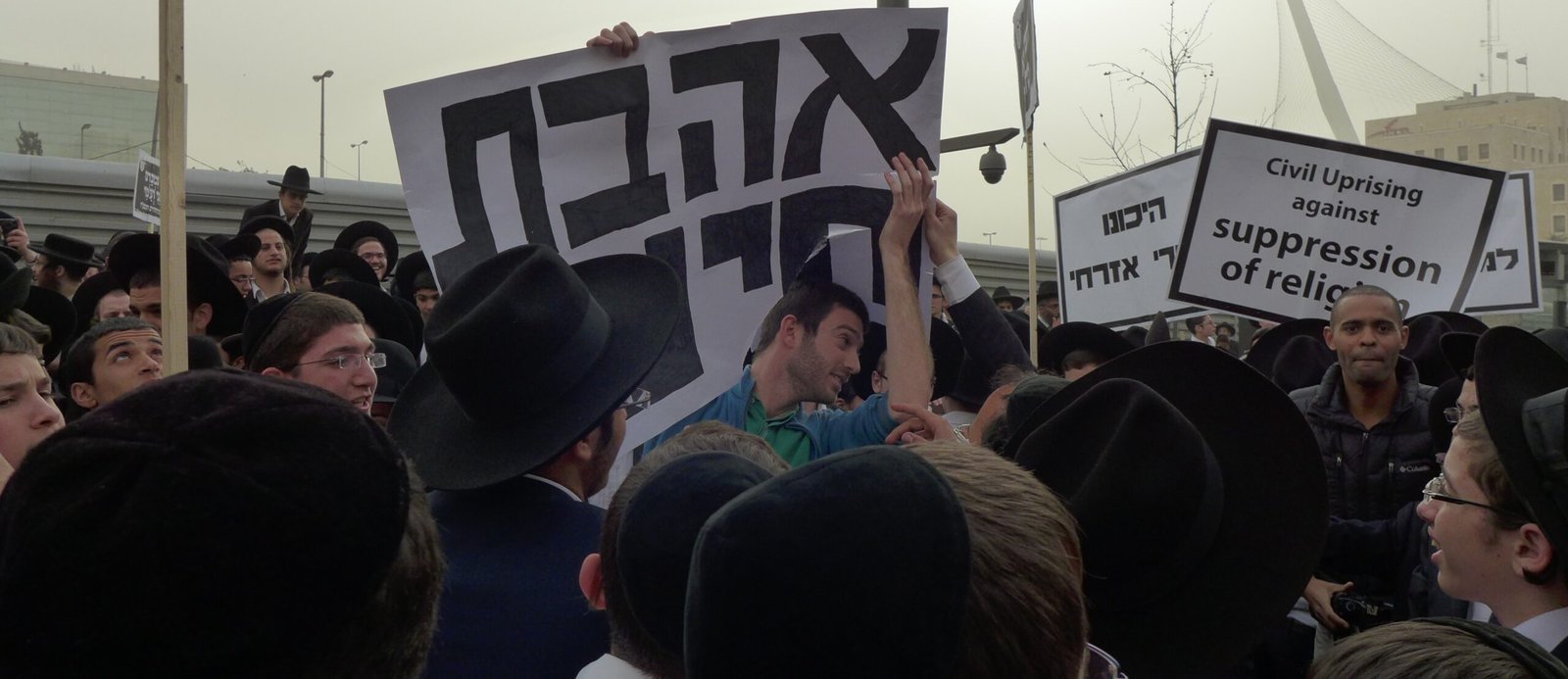Share This Story, Choose Your Platform!
So far, the author of Psalm 2 concentrated on immanent developments. He described what happens among the nations in a way which any newspaper reader, radio listener or television viewer can easily understand – having some basic understanding of biblical thought. Now, the psalmist pulls back the curtain to the invisible world. From verse 4 onwards, he opens up a perspective that looks at the whole scenario from the Creator’s point of view. Luther observes: “This is all so hidden, that you are not able to recognize it, when you are not in heaven.”[1]
“He who sits in the heavens laughs. The Lord scoffs at them” (verse 4). For those raging masses of nations, who rebel against His regulations, who wish to override the divine orders and declare the Word of God irrelevant, the Lord has nothing left but mockery.
God derides all the Gentile nations (Psalms 59:9), He laughs at the evildoer “because he sees that his day is coming” (Psalms 37:13). Rabbi Samson Raphael Hirsch[2] states, this laughter is “not actually an expression of joy”, but rather “a sneering, contemptuous laugh”. Laughter in the Bible is “without exception, an ironic laugh, a laugh that carries with it a certain negation, condemnation of the object that caused the laughter”. It is “exclusively caused by the perception of something ridiculous”.[3]
Once, Abraham and Sarah laughed, when the divine messengers claimed that the hundred-year-old man and his ninety-year-old wife would have a child in their old age (Genesis 17:17; 18:12). Too big, too ridiculous seemed the contrast between what could be grasped in accordance with logical human experience and what was said to them. Hirsch realizes: “The whole beginning of the Jewish people is ridiculous, its history, its expectations, its hopes, its entire life borne by these hopes appear to the reasoning that calculates only the ordinary, natural relations of causality as the most monstrous, ridiculous pretension.” Therefore, the son of Abraham and Sarah also gets the name “Yitzhak”, “one laughs” (Genesis 21:3,6).[4]
Yet, as ridiculous as God’s dealings with Israel may appear to Gentiles, the contrast between the excitement and effort of the non-Jewish nations on one side and the character and essence of the Creator on the other side is infinitely, unbelievably, unimaginably greater. And in God’s laughter and mockery lie scornfulness and contempt.[5] The kings have no way at all to do something against the will of the Lord.[6]
As ridiculous as the history, the way, and the hope of the Jewish people may seem to prosaic, down-to-earth, rational contemporaries, from God’s point of view, the thinking and planning of the nations and their representatives is anything but objective, realistic or reasonable. It is simply ridiculous. Luther words it strikingly: “O how great strength of faith is required in these words! For who could have taken to sense that God laughs… since it occurs to us, as if we are both by God and by men being mocked and trodden down.”[7]
Laughter often expresses a sense of security, a consciousness of superiority as opposed to fear.[8] God’s laughing shows: He is the One who has created this universe. He disturbs the nations and makes them migrate. He appoints kings, presidents, prime ministers and princes, and He also deposes them when their time has come. The Lord sits in heaven. He does not nervously run back and forth, rubbing His hands in desperation, because he might have lost the helm of world history. He sits and laughs because He has everything – really everything! – firmly under His control.
If this living God, the Creator of heaven and earth, the One who sits in heaven and laughs, indeed is my father, then I do not have any reason at all to be disturbed. No migration tsunami, no conflagration in the Middle East, no what-so-ever unreasonable decision of big-mouthed politicians, not even the evidence of underhand machinations of the powerful or frightening suspicions of destructive conspiracies can bring me out of the peace. The father laughs. May the Gentiles rage. The One in heaven has everything firmly under control.
The Lord laughs and scorns. If the Bible says the same thing twice, that shows a great certainty. Twice dreamed the Egyptian pharaoh, which meant that God would do what He had planned with certainty and soon (Genesis 41:32).
Rabbi David Ben Yosef Kimchi (1160-1235)[9] observes that the psalmist uses the present tense – “He laughs,” “He scoffs,” “He speaks” – in order to depict God actions. He does not place the scenario into a distant past which can be analyzed with interest but remains ultimately irrelevant. Neither does he speak of a future that may be postponed forever. The choice of words of the prophetic psalmist makes every fairytale “Once upon a time” equally impossible as the fantasies of a science fiction. The psalmist speaks in the present tense – whether this once was historically rooted for the contemporaries of King David or for the first Christians and their opponents in Jerusalem, or whether this could be relevant for us today or even describe a future global scenario.
Footnotes:
[1] Johann Georg Walch (hg.), Dr. Martin Luthers Sämtliche Schriften. Vierter Band. Auslegung des Alten Testaments (Fortsetzung). Auslegung über die Psalmen (Groß Oesingen: Verlag der Lutherischen Buchhandlung Heinrich Harms, 2. Auflage, 1880-1910), 264.
[2] Hirsch (1808-1888) came from Hamburg and served as Chief Rabbi in Oldenburg, Aurich, Osnabrück, Moravia and Austrian Silesia. As a distinguished representative of Orthodoxy, he was an outspoken opponent of reformist and conservative Judaism. Hirsch attached great importance to the study of all Scripture. From 1851 he was rabbi of the separatist Orthodox „Israelitischen Religions-Gesellschaft“ (“Israelite Religious Society”), engaged in education and published the monthly magazine “Jeschurun”. Hirsch had a great love for the land of Israel, was at the same time, however, an opponent of the proto-Zionist activities of Zvi Hirsch Kalischer. He is seen as one of the founding fathers of the neo-orthodox movement.
[3] Samson Raphael Hirsch, Die Fünf Bücher der Tora mit den Haftarot, übersetzt und erläutert von Dr. Mendel Hirsch, Erster Teil: Bereschit (Basel: Verlag Morascha, 2008), 317f.
[4] Samson Raphael Hirsch, Die Fünf Bücher der Tora mit den Haftarot, übersetzt und erläutert von Dr. Mendel Hirsch, Erster Teil: Bereschit (Basel: Verlag Morascha, 2008), 318.
[5] עמוס חכם, ספר תהלים, ספרים ג-ה, מזמורים עג-קן (ירושלים: הוצאת מוסד הרב קוק, הדפסה שישית תש”ן/1990), ז.
[6] עמוס חכם, ספר תהלים, ספרים ג-ה, מזמורים עג-קן (ירושלים: הוצאת מוסד הרב קוק, הדפסה שישית תש”ן/1990), ז.
[7] Johann Georg Walch (hg.), Dr. Martin Luthers Sämtliche Schriften. Vierter Band. Auslegung des Alten Testaments (Fortsetzung). Auslegung über die Psalmen (Groß Oesingen: Verlag der Lutherischen Buchhandlung Heinrich Harms, 2. Auflage, 1880-1910), 264.
[8] August Dächsel, Die Lehrbücher Hiob, Psalter, Sprüche, Prediger und Hohelied Salomonis, Das Alte Testament mit in den Text eingeschalteter Auslegung, ausführlichen Inhaltsangaben und erläuternden Bemerkungen III (Leipzig: Verlag von Justus Naumann, 2. Auflage 1876), 133.
[9] the so-called “Radak”, was the first among the great exegetes and grammarians of the Hebrew language. He was born in Narbonne, southern France. His father died early, so David was brought up by his brother Moshe Kimchi. Radak allowed philosophical studies only to those whose faith in God and the fear of heaven were firmly established. Publicly he dealt with Christians and attacked primarily their allegorical interpretation of Scripture and the theological claim to be the “true Israel”.






















